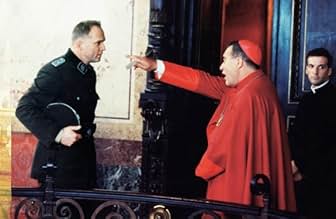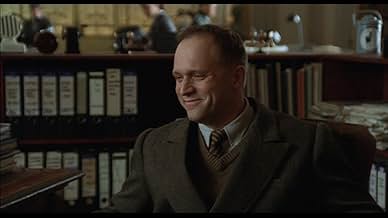SS-Offizier Kurt Gerstein will Papst Pius XII. darüber informieren, dass Juden in Vernichtungslager gebracht werden. Der junge Jesuitenpriester Riccardo Fontana hilft ihm bei der schwierigen... Alles lesenSS-Offizier Kurt Gerstein will Papst Pius XII. darüber informieren, dass Juden in Vernichtungslager gebracht werden. Der junge Jesuitenpriester Riccardo Fontana hilft ihm bei der schwierigen Mission, die Welt zu informieren.SS-Offizier Kurt Gerstein will Papst Pius XII. darüber informieren, dass Juden in Vernichtungslager gebracht werden. Der junge Jesuitenpriester Riccardo Fontana hilft ihm bei der schwierigen Mission, die Welt zu informieren.
- Regie
- Drehbuch
- Hauptbesetzung
- Auszeichnungen
- 4 Gewinne & 9 Nominierungen insgesamt
Empfohlene Bewertungen
This is an excellent film, and exemplifies, I think, the role of the arts in raising society's level of conscience and effecting social change. It galls me that a mind set is growing, (sixty years later) that refutes the occurrence of the holocaust. All the pictures, names and movie footage in the world will never change these people's minds; convincing them is not the issue. But when you take on the large institutions of society, when you make them accountable and demand that they fess up to their inadequacies, and that they not allow it to happen again, then you get the kind of permanent, positive change that is not eroded by a capricious shift in the political winds.
The amazing thing about this film was the powerful effect it achieved with very little, if any, shocking footage. We are conditioned to look away from all the "standard" holocaust images - the drawn faces, the gaunt skeletons, the bones in the ovens, the piles of shoes and personal effects. Instead, Gavras uses Gerstein's involvement with the engineering side of the issue, and paints a chilling picture of the magnitude of the killings. The project management meetings where they discuss the efficiency improvement strategies for gassing people and cleaning out the chambers are eerily similar to meetings I and many other Dilbert-types attend on a regular basis. The final scene at the camp where all the SS facilities officers chorus their concerns over decreased KILLING efficiency is ridiculously chilling. These guys could be whining about their bottom line numbers at a board meeting for any major corporation.
Gavras hammers home the numbers with the repeated scenes of empty trains going and full trains coming - and you never see a person in the full ones, only closed doors. Think about the numbers. A million people a year is nearly three thousand a day. Instead of making his point with stark images, the way so many other films have, Gavras keeps hammering the shear logistics, the size of the camps, the amounts of the gas needed, the HUGE numbers of people that had to be transported. Think of how big a train with a thousand people is - that's over three times the capacity of the biggest airliners. Gerstein's confrontation with his old friend, the transportation officer, points out how people could vilify certain nazis (SS and Gestapo), and yet remain conveniently ignorant of their own complicity.
The Vatican issued a watered down apology in 1998, admitting partial culpability and asking forgiveness. There are still many who believe that the diplomatic tightrope the Vatican walked was the best course. The conversation between Cardinal Maglione and the German ambassador is accurately taken directly from the Vatican archives. But Gavras makes a valid case that the arguments against outing the German killing machine were weak. That other protests had yielded positive results (look up the 1943 Rosenstrasse uprising) and that the motivations for not acting more decisively were based in part on anti-Semitism, along with diplomatic prudence.
Gavras trys to show that many people who could have acted knew all the facts and chose not to act. I remember, around the time Gavras' released "Z", how the protesters at the 1968 democratic national convention chanted "THE WHOLE WORLD IS WATCHING. THE WHOLE WORLD IS WATCHING!" It didn't matter then, and Gavras makes the case that it didn't matter during the holocaust; the political powers of the world move at their own pace.
Now, sixty years later, we have the last of the actual participants dying off. WWII veterans here in the USA are dying at a rate of 1500 a day, and their ranks are dwindling. There are fewer and fewer left to tell the story or be held accountable. It is incumbent on us, however, to uncover the cover-ups, identify the systems or methods that allowed such atrocities to happen, and make the changes in our society's structure to ensure they don't happen again. Gavras' film effectively does this. Like the principals in the film, we now know the real story. Like the principals in the film, how we act with this knowledge will be judged by future generations.
The one dimensional nature of the main characters works very well - we see but a snapshot of the complexity of human nature and this begs you to ask the question of what would you do if you found yourself placed in such circumstances.
This is perhaps a trademark of Costa-Gavras's work (Mad City, Missing and Z in particular)
It is not just a cold view of the history of the time nor is it seeking to provide an answer to the big question - just shed light on the circumstances and on human nature.
The murder of his niece and the Jews appalls his Christian conscience. His wincing reaction whilst looking through the gas chamber spy-hole is well-acted. He alerts the Swedes and the Catholic Church, hoping that international pressure will awaken the German conscience. Catholic opposition has stopped the euthanasia programme and this can be mobilised to help the Jews.
In reality, Gerstein's options are limited. His own church leaders react mutely to his news of mass-murder. They caution restraint. Nazi indoctrination is trying to turn everyone into a rabid anti-Semite - as shown comically with Gerstein's youngest son giving annoying Hitler salutes. Most Protestants agree to join the new Nazi-sponsored 'Reich Church', happily reconciling faith with Nazism. Similarly, the 1933 Concordat with Hitler gave the Catholic Church a precarious protection as long as it stayed out of politics.
Carpet-bombing of German cities is killing women, children and babies. German forces are engaged in a titanic struggle against the 'forces of international Jewry ' - Russian Communism and American Capitalism. Facing this kind of mind-set and mass paranoia, the Jews needed a miracle. Saving mentally-handicapped members of German families is one thing. Saving a long-despised race thought to be the root cause of every world problem is very much another.
Gerstein's attempts to alert the Vatican are channelled through an invented character, a young Catholic priest who symbolises the conscience of thousands of individual Catholics who risked their lives to help Jews. He eventually sacrifices himself at Auschwitz, a Christ-like figure who 'redeems' his religion in the face of a terrible evil.
The controversial Pope Pius XII is portrayed in a curiously anodyne way - to the distaste of those who regard him as a Nazi sympathiser. The Vatican's fear of Communism, its efforts to hide Italian Jews and its self-preservation instinct in facing the Nazis are all clearly demonstrated. As is the help it gave to individual SS men on the run after the war. One is left to make up one's own mind about the Pope.
In truth, neither the Church nor the SS were monolithic organisations. Both were composed of individuals, good and bad. One reason for death factories was to save SS men from the horrors of mass-shootings. They offered a 'sanitised' method of killing, just as the 1933 Concordat offered a sanitised way for Nazism and Catholicism to relate to each other. Problems arose for individuals who had to make moral choices in carrying out these policies.
The controversial Roman lunch scene depicts the American ambassador discussing the fate of the Jews with Vatican big-wigs. Against a wonderful panoramic backdrop of the eternal city, they enjoy an excellent sea food meal. The American points out that finding an alternative home for millions of Jews would cause great problems. Nazi retaliation would only make things worse, counters a Vatican big-wig. A far cry from the cattle trucks rolling to and fro, emptying Europe of its Jews. This is a 'cheap shot' - decision-makers usually enjoy better material conditions than the rest of us. One can imagine Churchill discussing sensitive topics in a cold-blooded way over many a fine meal. It makes for good cinema, though!
This is an excellent film which covers a vast topic in 2 hours. It does not make judgements about Gerstein or the Christian churches. The Gerstein character is a complex one as is the Christian response to the Holocaust. It shows how difficult it is to 'buck the system' during wartime. Gerstein arrives at Auschwitz with the comforting knowledge that the allies 'never bomb the camps' - they know they are full of 'POW's'. Would prolonged bombing of the railways to the death camps have made a difference? Many Jews believe that this could and should have happened.
Should the allies have re-directed their military efforts to save Jews rather than merely fight the Nazis? Unfortunately, the 1930's and World War 2 had de-sensitised people to civilian suffering - newsreels from China, Abyssinia, Guernica; the Nazi bombing of Warsaw, Rotterdam, London, Coventry, the V1 and V2 attacks of 1944. World War I blurred the line between soldiers and civilians. World War 2 completely obliterated this distinction - on both sides of the conflict. Axis forces brought death to millions of Chinese and Russian civilians. The Allied bombing of Germany, Japan and northern France all produced heavy civilian casualties. Is there an essential difference between mass-bombing and the Holocaust?
European anti-Semitism aided the Holocaust. The miracle is that so many individual Gentiles did so much to aid Jews. Nazism put new ideas about human rights to the test. Governments and organisations may have been found wanting especially Vichy France. Individuals - including many brave Germans responded magnificently. This is the 'positive' side of the Holocaust which we should remember and treasure. Gerstein did his best to sabotage and stop the killing machine he became part of. The film allows us to make up our own minds about whether he and the Catholic Church did enough.
I do not have the knowledge of history to know whether this story is accurate or manipulative, but as a movie it is powerful and striking. Costa-Gavras directs this film about Holocaust based on the history of the German Kurt Gerstein, who unsuccessfully tried to tell the world about the mass murderers in the concentration camps. The performance of Ulrich Tukur is magnificent, giving total credibility to his character. With regard to the role of the Catholic Church, I believe the exposition is simplistic and does not show the big picture of the political environment that the Vatican was living in that historical moment, focusing only in the attempt of the SS officer in having an audience with the Pope. My vote is eight.
Title (Brazil): "Amém." ("Amen.")
Wusstest du schon
- WissenswertesStefan Lux was a Jewish Czech journalist, who committed suicide in the general assembly room of the League of Nations during its session on July 3, 1936, to alert the world on the perils of German anti-Semitism. After shouting "C'est le dernier coup" ("This is the final blow") he shot himself with a revolver.
- PatzerIn one of the scenes they say that the Treblinka camp is out of gas, referring to Zyklon B. Treblinka didn't use Zyklon B, instead they used carbon monoxide.
- Zitate
[first lines]
Stephan Lux: [interrupting a session of the Assembly of the League of Nations, Geneve, 1936] My name is Stephan Lux. I am Jewish. The Jews are being persecuted in Germany and the world doesn't care.
[He draws a pistol]
Stephan Lux: I see no other way to reach people's hearts.
[He shoots himself]
- VerbindungenReferenced in Kaamelott: Amen (2005)
- SoundtracksThe Train I /II
Composed and arranged by Armand Amar
Orchestra:
Jean-Philippe Audin, Elsa Benabdallah, Igor Boranian, Fabien Boudot, Florent Bremond, Karen Brunon, Nathalie Carlucci, Hervé Cavellier, Emmanuel Gaugué, Thierry Köhl, Julien Leenhardt, Bobin Minalli Bella, Marthe Moinet, Yves Monciero, Philippe Morel, Amèlie Paradis, Emmanuel Raynaud, Alexandre Sauvaire
(P) & © 2002 Long Distance/France
Top-Auswahl
- How long is Amen.?Powered by Alexa
Details
- Erscheinungsdatum
- Herkunftsländer
- Offizielle Standorte
- Sprachen
- Auch bekannt als
- Amen.
- Drehorte
- Produktionsfirmen
- Weitere beteiligte Unternehmen bei IMDbPro anzeigen
Box Office
- Budget
- 103.000.000 FRF (geschätzt)
- Bruttoertrag in den USA und Kanada
- 274.299 $
- Eröffnungswochenende in den USA und in Kanada
- 16.284 $
- 26. Jan. 2003
- Weltweiter Bruttoertrag
- 8.419.052 $
- Laufzeit2 Stunden 12 Minuten
- Farbe
- Sound-Mix
- Seitenverhältnis
- 1.85 : 1
Zu dieser Seite beitragen


































